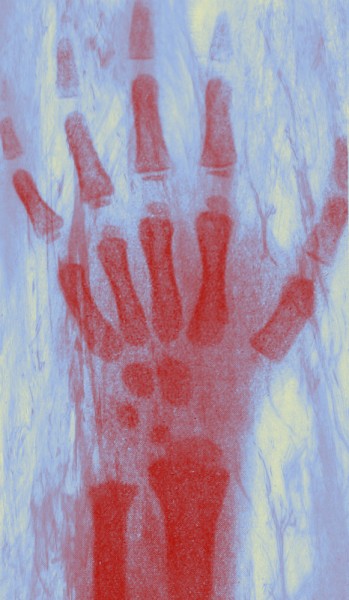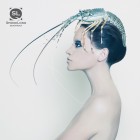Pia hides under the breakfast table while her mother hunches on the couch and scratches at her palm. Inside the house, acrid air. Leaves of Grass—her mother’s favorite, gifted from Pia’s father—long unopened. The slap-slapping of her mother’s sandal as she bobs her knee. The way her polyester pant leg flutters, the way her mouth trembles as she mutters to herself. The hairs on top of her mother’s lip, unshaven. Pia wants to crawl out from under the table, to remind her that she’s there. But her mother’s ample mouth droops, and Pia remains where she is.
For several minutes her mother has been scratching—distressingly, achingly—at her lifeline. The trait isn’t new, but the intensity is. As each minute passes, Pia’s stomach sinks, to her thighs, her knees, her feet. Her mother squeezes her own wrist. Veins Pia never noticed push against her skin. Pia sits on her heels, and her sundress rustles—surely her mother will notice—but there again is that acrylic nail against dry skin.
After a while, her mother studies her palm. She scratched at her lifeline when Pia’s father trained for a marathon, lengthening the time of scratching with each new mile he ran. She scratched when her father went to bed earlier than Pia did. And when he went out at midnight to drive along the highway. And now, once more, her mother’s determined scrape-scraping. Like the calico who visits their yard, scratching at the back door’s screen.
Pia scratched at her own lifeline once, but couldn’t make the same sound—her nails were too short, her mother cut them below her nail beds—and the muted scratching bewildered her, this difference from her mother.
Absently angling her palm toward Pia, her mother digs, getting closer to the mystery beneath her flesh, a mystery that stuns Pia every time she skins a knee. One afternoon she fell off her bike, and blood oozed down her leg, the heat of it puzzling her. “Are we made of fire?” she asked her mother, who shrugged and said, “More likely, ice.” If ice made her mother, did fire make her father? Pia despairs—she doesn’t want to be like him, evaporating into the air like steam from a cauldron. A week ago he went on a drive and hasn’t come back.
Scraping, her mother moans as blood beads from her lifeline. The bead streams down her hand, that icy trickle. Gasping, Pia feels the trickle on her own skin, piercing like an icicle, numbing and panicking her. Her mother’s face reveals a different story. Pia imagines her wading into a winter ocean, the cold freezing her veins, her mouth slackening in relief. Her mother wades further, and ice encases her body as she floats peacefully out to sea.

Notes from Guest Reader Gary Fincke
The child’s point of view clinched this for me. It allowed for mystery and discovery and literal, physical curiosity of the uninitiated while the reader concentrates on the mother’s/wife’s loss through a succession of “disappearances.” And it holds up on a second and third reading, revealing something new each time.


 The core workshop of SmokeLong Fitness is all in writing, so you can take part from anywhere at anytime. We are excited about creating a supportive, consistent and structured environment for flash writers to work on their craft in a community. We are thrilled and proud to say that our workshop participants have won, placed, or been listed in every major flash competition. Community works.
The core workshop of SmokeLong Fitness is all in writing, so you can take part from anywhere at anytime. We are excited about creating a supportive, consistent and structured environment for flash writers to work on their craft in a community. We are thrilled and proud to say that our workshop participants have won, placed, or been listed in every major flash competition. Community works.